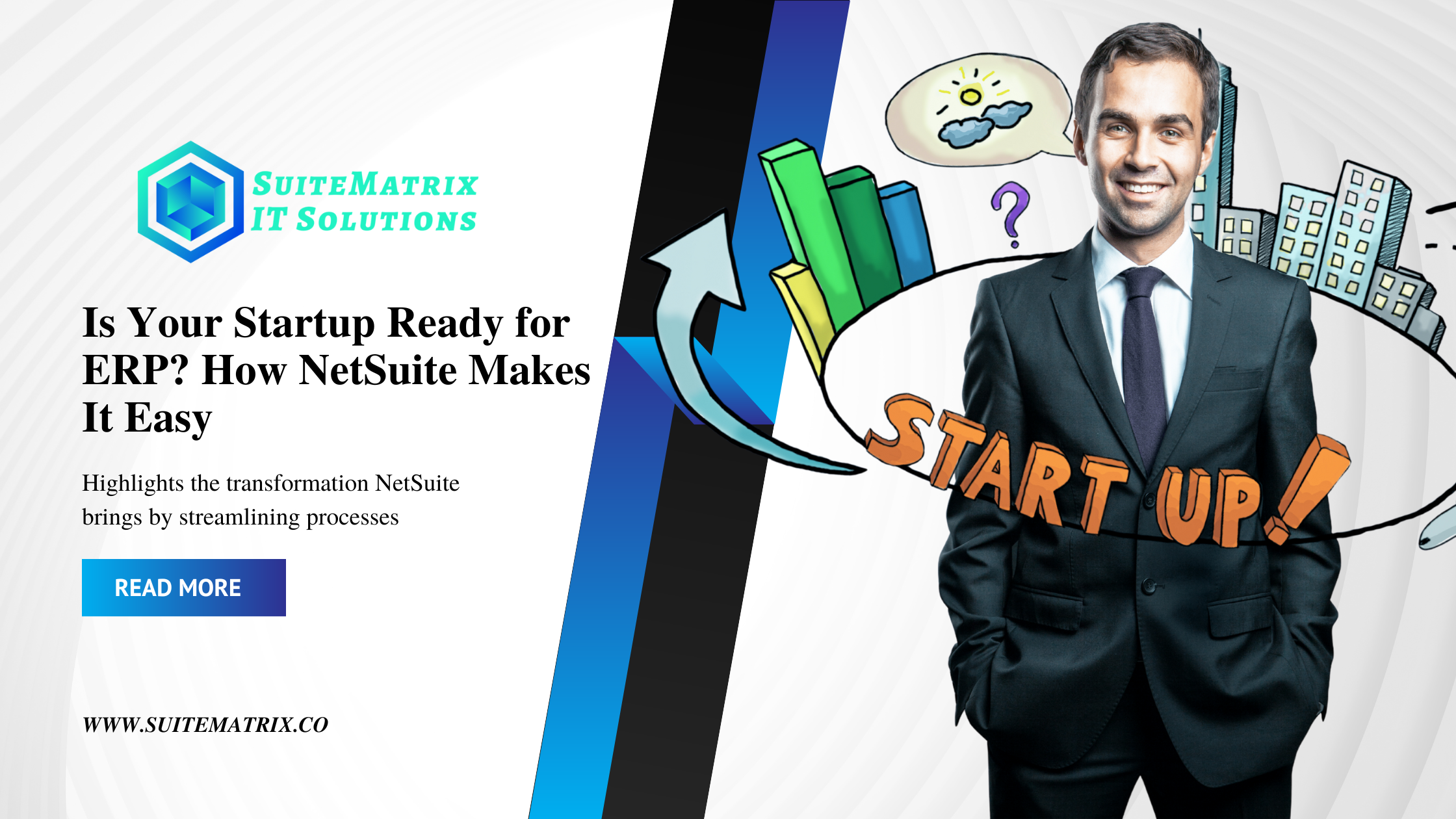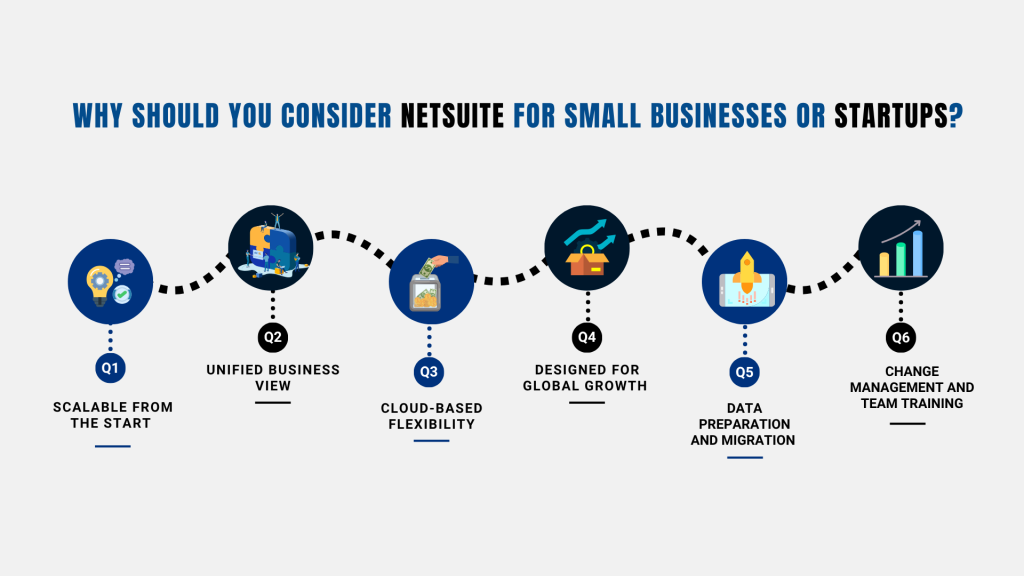
Content Outline
- Introduction
- Why Should You Consider NetSuite for Small Businesses or Startups?
- Key Considerations When Implementing NetSuite as an ERP Solution for Startups
- Choose SuiteMatrix: Your Startup’s NetSuite Implementation Partner
- How Does NetSuite ERP Pricing Work for Fast-Growing Businesses?
- Conclusion: Is Your Startup Ready?
Is Your Startup Ready for NetSuite ERP? Explore the Benefits
For many startups, growth is both a goal and a challenge. As your team expands, customer demands grow, and investor expectations rise, your internal systems can quickly become overwhelmed. If you’re still relying on disconnected tools like spreadsheets, basic accounting platforms, or entry-level CRMs, it may be time to adopt a more integrated, scalable system.
This is where ERP NetSuite, a leading cloud ERP solution, becomes invaluable—especially for startups and funded companies preparing for rapid expansion.
In this blog post, we’ll walk through why NetSuite is an ideal ERP solution for startups, what to consider before implementing it, how SuiteMatrix can support your ERP journey, and how NetSuite’s pricing model works for growth-stage companies.
1. Why Should You Consider NetSuite for Small Businesses or Startups?
Startups typically begin with minimal systems in place. Initially, a simple spreadsheet and a basic accounting app might suffice. However, as your operations scale—especially after a funding round—these tools begin to fall short. You may start noticing errors in reporting, delays in closing financial periods, or difficulties aligning inventory, sales, and customer data.
NetSuite ERP system provides a unified platform that integrates your business processes into one cloud-based solution. Here’s why it’s especially valuable for startups and small businesses:
Scalable from the Start
Unlike many ERP systems that are built for large enterprises, NetSuite is designed to scale with your company. It can support startups from early-stage to post-IPO without requiring a platform switch.
Unified Business View
NetSuite integrates financials, CRM, inventory management, and eCommerce. This gives your team a single source of truth for making real-time business decisions.
Cloud-Based Flexibility
As a cloud ERP solution, NetSuite requires no on-premises hardware or dedicated IT team. Startups can access the system from anywhere, making it ideal for hybrid or remote-first teams.
Designed for Global Growth
If your startup plans to expand internationally, NetSuite supports multi-currency, multi-language, and regulatory compliance out of the box.
In short, NetSuite ERP system is built for the agility and speed startups require, while also providing the structure and discipline needed to scale operations.

2. Key Considerations When Implementing NetSuite as an ERP Solution for Startups
While NetSuite offers robust capabilities, startups should approach implementation strategically. Choosing the right modules, timeline, and support structure is essential to a smooth rollout.
Timing Your Implementation
The best time to adopt NetSuite is either before a major growth phase or shortly after a funding round. Implementing it too early may stretch your resources, while waiting too long could result in operational inefficiencies that hinder scaling.
Define Critical Modules First
Startups don’t need to launch every feature at once. Begin with essential modules like financials, CRM, and inventory, then expand as needed. This phased approach helps manage cost and complexity.
Data Preparation and Migration
Clean, accurate data is the foundation of a successful ERP. Startups should review and organize existing data sources before migration to avoid technical debt.
Change Management and Team Training
Your employees may be used to manual or fragmented systems. Invest in training and change management to ensure your team adopts the platform effectively.
Implementing the ERP NetSuite system is a strategic move. With the right preparation, it will significantly streamline operations and improve business agility.
3. Choose SuiteMatrix: Your Startup’s NetSuite Implementation Partner
Selecting the right ERP is only half the journey. The other half is the implementation—and for startups, choosing the right partner is crucial. That’s where SuiteMatrix comes in.
We specialize in helping startups and fast-growing companies get up and running with NetSuite quickly, efficiently, and with a clear ROI in mind.
Why SuiteMatrix for Startups?
- Startup-Focused Approach: We understand startup timelines, constraints, and priorities. Our team customizes implementation strategies for your growth stage.
- NetSuite Expertise: Our certified consultants have deep experience in deploying NetSuite ERP systems for companies across industries.
- Faster Time-to-Value: We prioritize rapid configuration and deployment, so you can begin realizing benefits in weeks, not months.
- Ongoing Support: Beyond implementation, we offer continuous optimization and support as your startup evolves.
By partnering with SuiteMatrix, you gain a strategic advisor committed to helping your ERP investment drive long-term growth.
4. How Does NetSuite ERP Pricing Work for Fast-Growing Businesses?
One common concern for startups is pricing. The good news is that NetSuite’s pricing model is flexible and modular, which makes it well-suited for funded startups and companies with aggressive growth plans.
Core Pricing Components
- Base License Fee: This includes access to NetSuite’s core modules, typically centered on financials and accounting.
- User Licenses: Pricing is based on the number of users. You can start small and scale as your team grows.
- Add-On Modules: Only pay for the features you need, such as CRM, inventory management, or eCommerce.
- Implementation Fees: Costs will vary depending on your partner, business complexity, and scope of implementation.
Because of this modular pricing structure, startups can start to lean and expand their usage over time. There are also NetSuite startup packages designed for high-growth businesses that want to get up and running quickly without sacrificing quality.
Conclusion: Is Your Startup Ready?
If your startup is experiencing rapid growth—or planning for it soon—it’s important to ensure your internal systems can support the journey. A disconnected tech stack will eventually slow you down, affect reporting accuracy, and reduce investor confidence.
NetSuite ERP system, when implemented with the right strategy and partner, can be the catalyst that takes your startup from reactive to proactive, empowering you with automation, visibility, and scalability.
And with a trusted advisor like SuiteMatrix by your side, the transition to a cloud ERP solution doesn’t have to be disruptive. It can be a launchpad for your next phase of growth.
